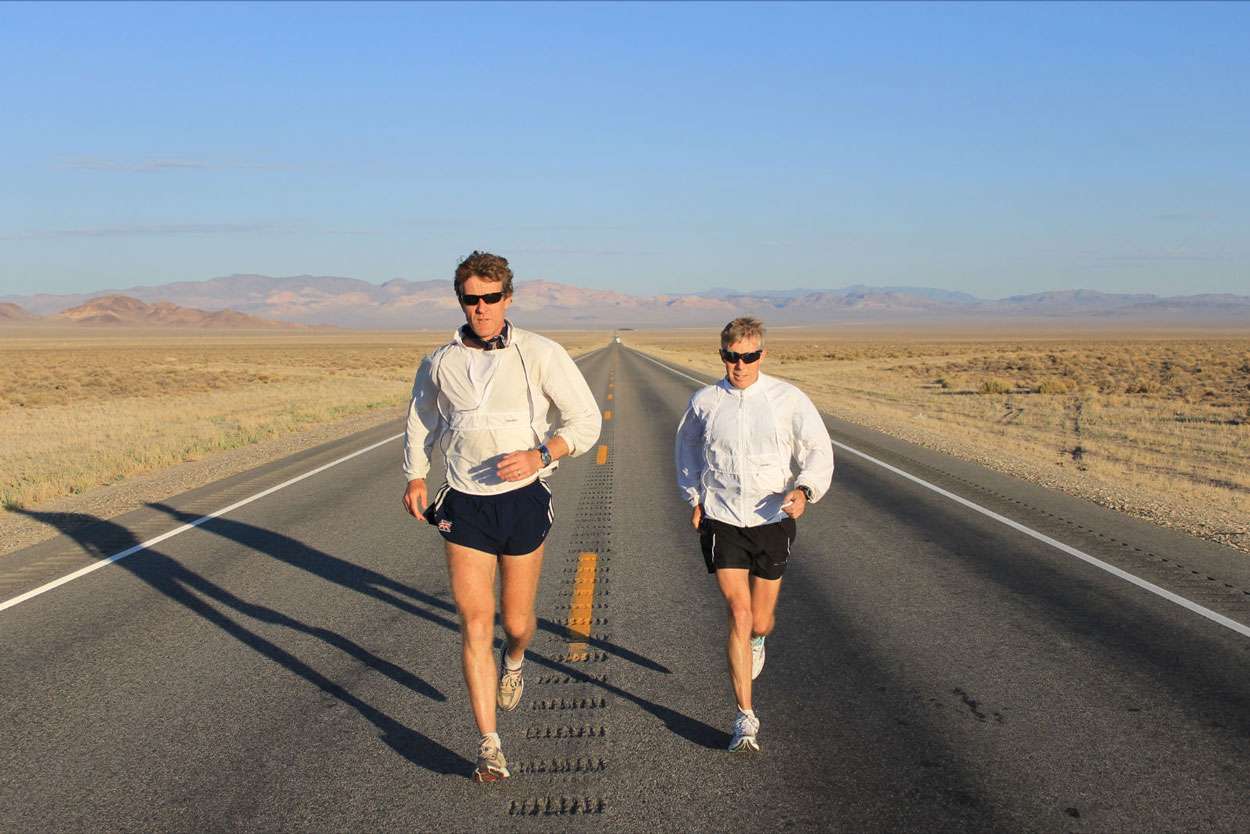
Chris Finill, left and Steve Pope keeping the pace up on their ‘Help for Heroes’ fundraising run across America
I was born in Harrow, Middlesex on the last day of 1958. I went to a local state primary school which coincidently was the same school Sir Roger Bannister attended. I then went to Harrow County Grammar School (a few years above me were Clive Anderson and Michael Portillo) and from there I went onto study Economics at the University of Surrey.
I met my wife, Julia, a couple of years later when she was nursing at Guy’s Hospital. She came from Cranleigh and, although we didn’t settle in Cranleigh immediately, we had gravitated towards it by 1995 as she was familiar with the village from her childhood and I had already fallen in love with Winterfold.
Since my early childhood I have loved running. Ironically it all started because of my mother’s smoking habit. I used to run up to the shops to buy her cigarettes which in those days I could do, even as an 8 year old. Each time I would time myself to see if I could beat my previous personal best. Running around the garden and counting laps and things like that were just part of my childhood and upbringing. My grandfather had been a very good cyclist and my mother a hurdler. My father excelled as a cricketer and he was desperate that I should follow in his footsteps out to the crease but I had no real aptitude nor attitude for it which was a disappointment to him. Instead I made my way into athletics.
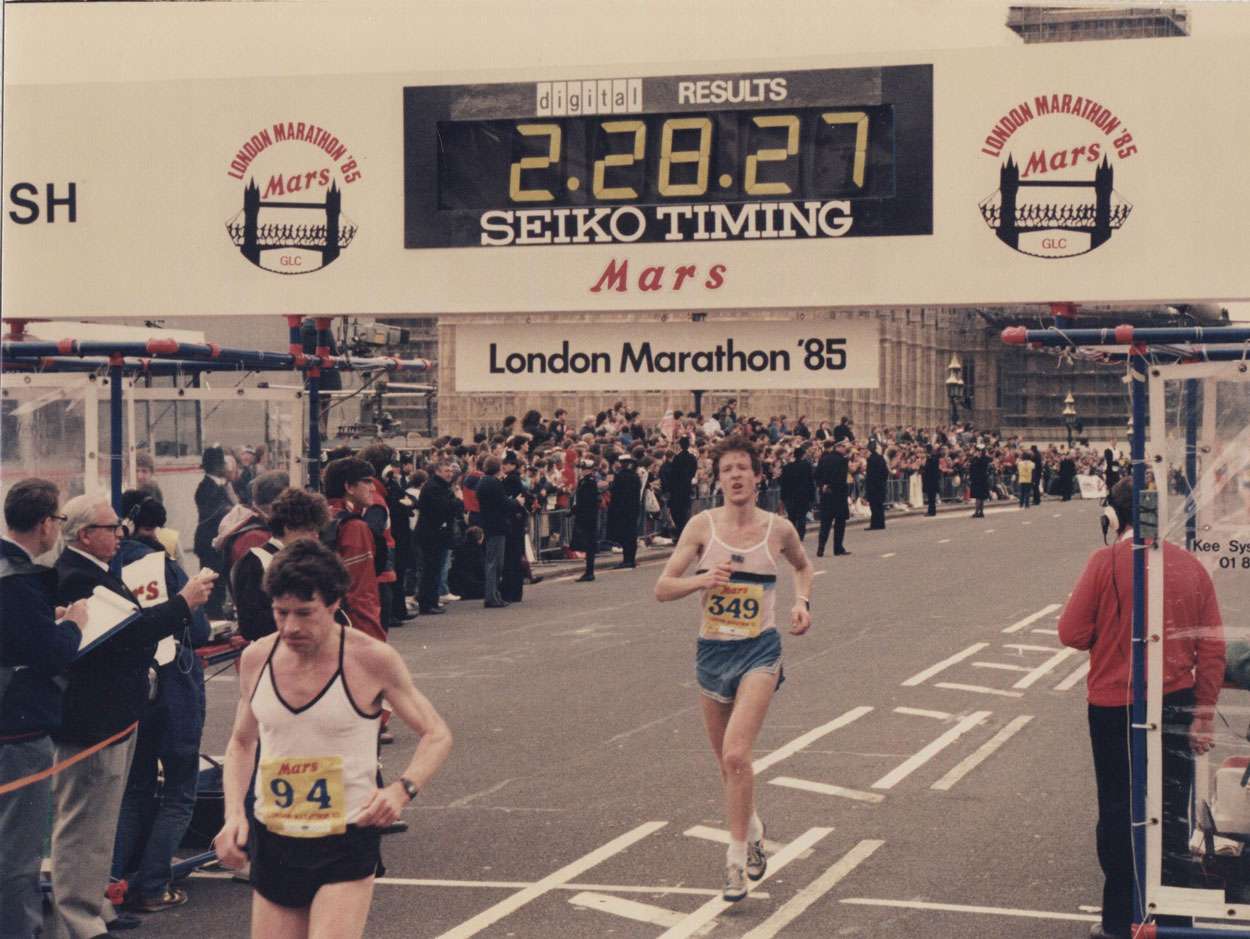
Completing the London Marathon in 1985
Running has therefore always been inside me, a passion from the moment I was old enough to put one foot in front of the other. My childhood heroes were David Bedford and Ron Hill. Added to this, my geography teacher at school was a 2.19 marathon runner and a close friend who progressed to 2.14 also served to inspire me in those early days back in the mid-seventies.
Having started university in 1977 I joined the cross country club, running my first marathon when I was 20 as an exchange student at Michigan State University in the USA. Back then in 1979 running a marathon wasn’t a particularly fashionable thing to do but these days the challenge has really gathered pace. At that time I was obviously very inexperienced and I went off at a ridiculously fast pace, like you do when you are 20. I ran 2:40 for this first marathon so I comfortably broke 3 hours but I was in bits at the end. I collapsed at the finishing line and was taken into an ambulance to have a massage and to generally be put back together again.
Thankfully I recovered pretty quickly but this was a good thing to go through because I learnt early on how not to run marathons, like people tend to when they run their first ones.
Chris Brasher and John Disley were the guys who founded the London Marathon based on what they had seen work so well in New York. I never met Chris, but I did meet John in May 2011 when I was selected as a test athlete for the 2012 Olympic marathon course. I ran the first London Marathon in 1981, then the second, then the third . . . and over the years I have run 33 consecutive London marathons from 1981- 2013 in under 3 hours and that is a world record for any marathon runner.
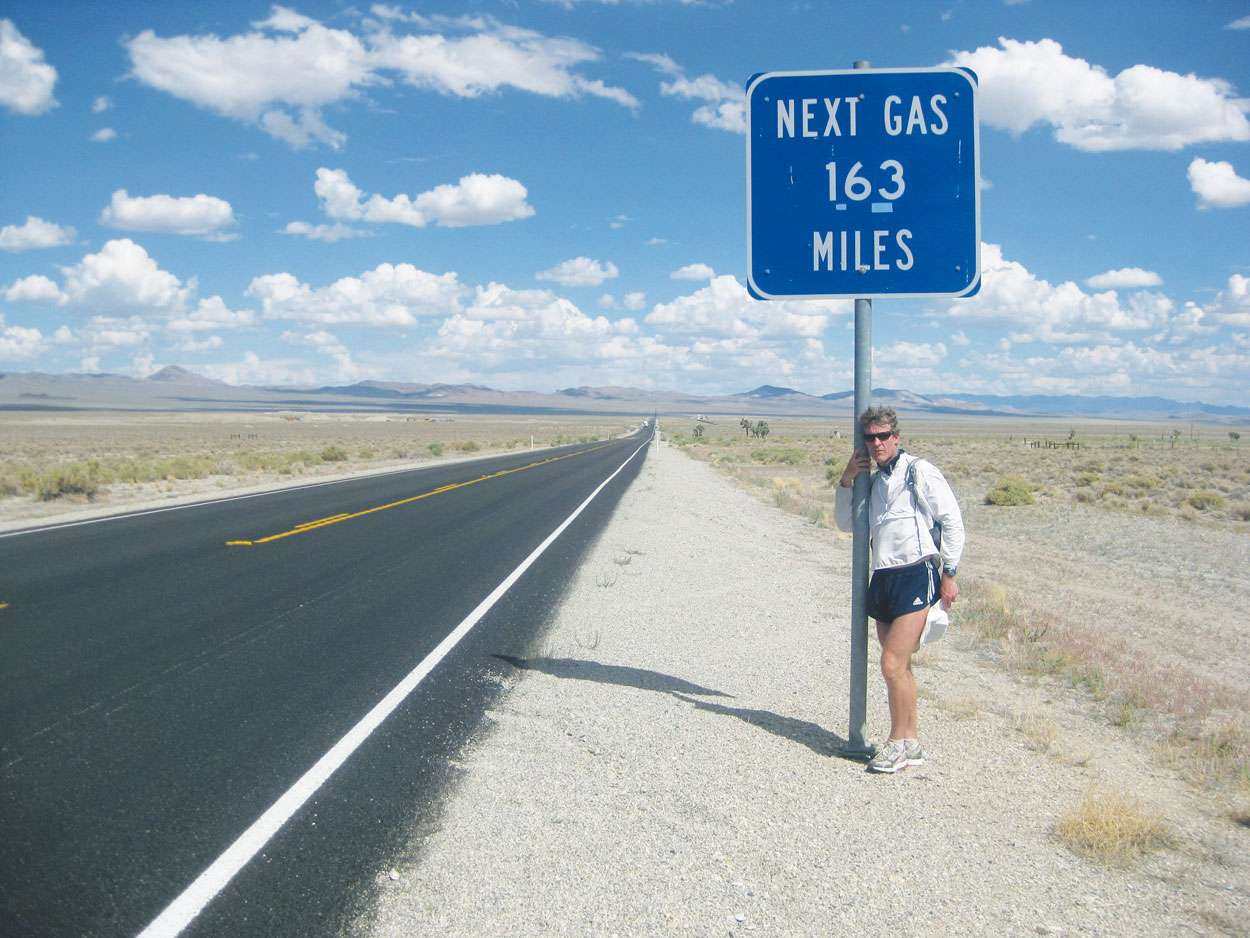
Taking a ‘breather’ during the Ultra Race across America from the West to East coast – a total of 3,100 miles
Some London Marathons have proved tougher than others. I broke my arm in this years event, my 38th London. I had gone through the first 5km and everything was fine . . . but at about 3 ½ – 4 miles I was clipped from behind and fell crashing to the ground, landing on my right humerus. I subsequently found that I had broken it in 4 places but at the time I got up immediately like boxer who had just been hit. I checked in to the St John Ambulance tent where I was given a basic, temporary sling and two paracetamol tablets, running the remaining 22 miles to the finish in The Mall. People ask why I carried on running and the explanation is simple. Having run the first 37 Londons I was desperate to finish the 38th and maintain my Ever – Present record.
I was never an outstanding runner at school nor for my club on the track over say 5 or 10 miles. I have, however, trained with athletes who have competed at Olympic level or won national titles at such shorter distances. I didn’t train 100 miles a week when I was in my 20s and this meant, looking back, that I could carry on training at a higher level as I went into my 30s and 40s. I suppose I’m relatively ‘well preserved’ for an athlete in the sense that I didn’t really push myself that hard when I was younger. If I’d run 100 miles a week when I was 25 I would have run faster marathons then but I probably would not have competed as effectively as an older athlete.
Anyway, my marathons evolved into ultra-races (races over marathon distance) and I ran for Great Britain in various European and World championship events. My Ultra-races then evolved into a trans-continental attempt which I undertook in the Autumn of 2011, running across America from California to New York. I ran this along with a running partner of mine called Steve Pope, supported by my wife Julia and Ben Southern who’s also from Cranleigh and who made a documentary of our trip.
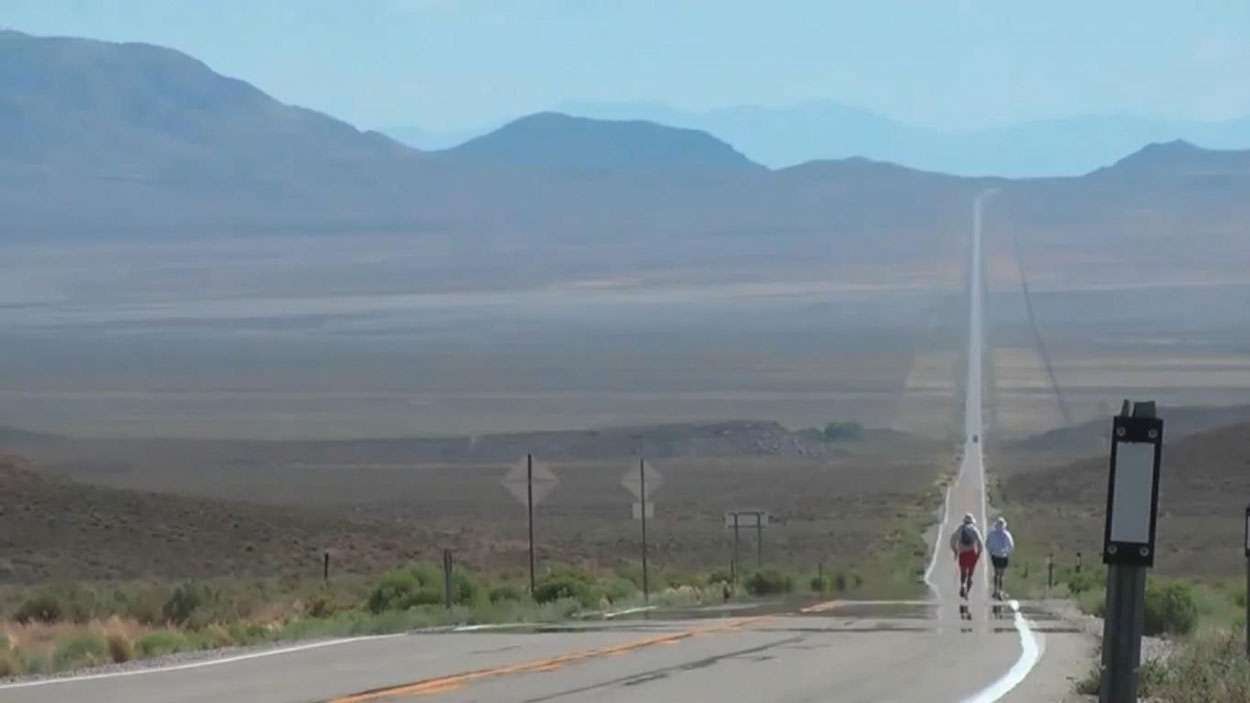
“Are we nearly there yet?”
Steve and I ran about 40 miles per day for 79 days and 22 hours to successfully complete the distance of 3,100 miles. At times during that event I felt like giving up. But when one has committed as much as I had I realised I couldn’t live with myself if I simply jacked it in. There were moments on the run when it was very, very tough, but that’s the nature of a big challenge.
As far as strategy was concerned we obviously didn’t go out and run 40 miles as fast as we could and then take the rest of each day off. Instead, we would be out on the road by 8am at the earliest and off by at 6pm at the latest. That doesn’t mean we ran from 8am to 6pm, it depended how far away from the start point we were staying at the time, but we would take it slowly taking advantage of the great US coffee shops and diners along our route. You don’t run across the continent by going off too quickly or rising to the challenge too eagerly. You have to ask your body nicely. We had a support vehicle and Julia would drive us to the motels at the end of each day where we would try to recover before starting all over again the next day. In tandem with the run we managed to raise about £14,000 for Help for Heroes.
This whole challenge needed planning both in time and finance. The Governors at The Duke of Kent School in Ewhurst where I have served as Bursar for over 20 years, were kind enough to give me a sabbatical, so I thankfully had a job to return to. Steve was self-employed so it was easier for him in some respects. Julia was also given a sabbatical from RHW, the Guildford firm of solicitors. We funded the trip almost entirely privately but we had a some very welcome sponsorship from RHW and kit sponsorship from a company based in the States.
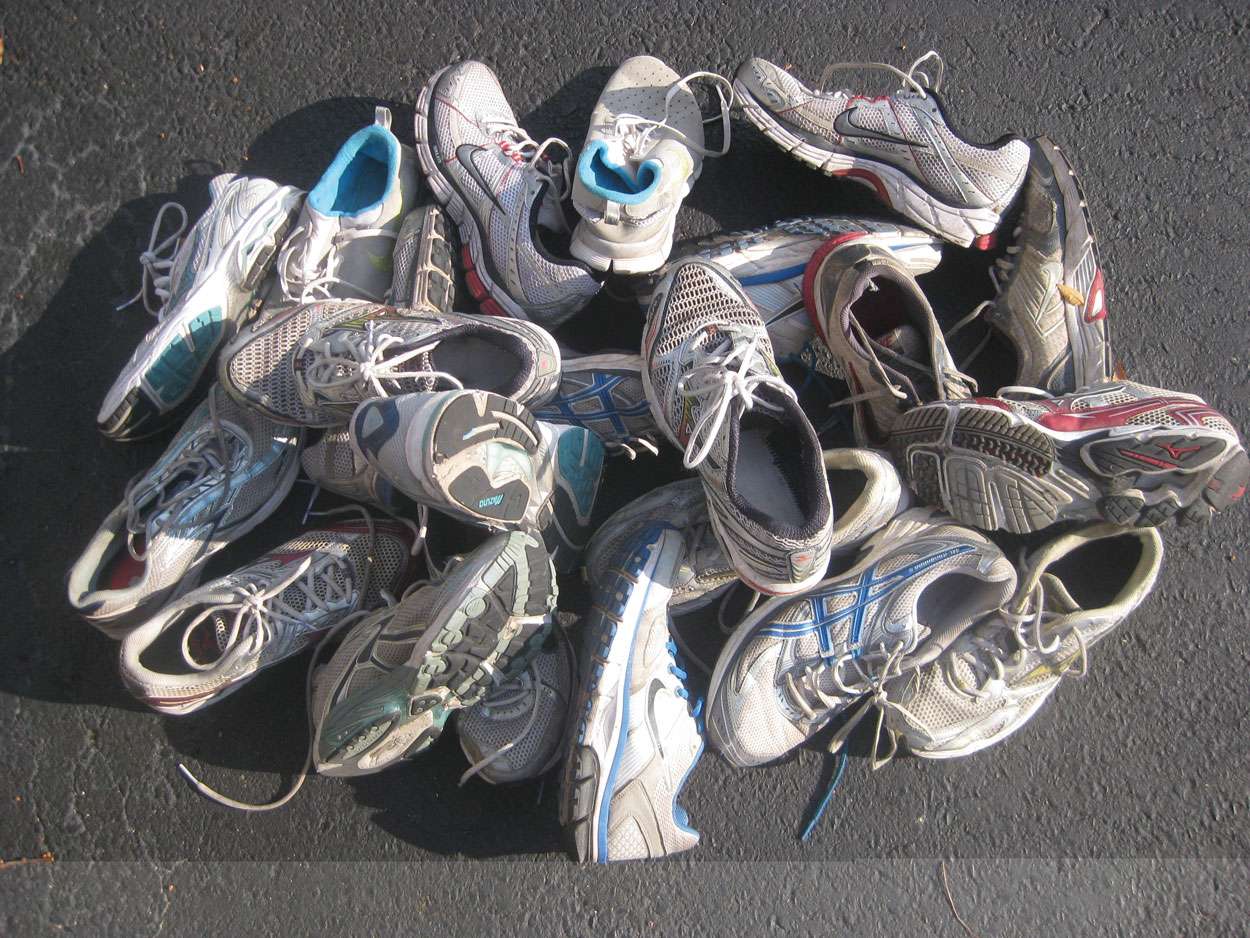
Old used trainers
Over the years some races stand out – a couple in particular. Representing Great Britain I came 14th in the World 100km championships in Taiwan in 2003. It would have been a long way to go to run badly! Later, in 2008 I ran a 24 – hour race, a race where you simply see how far you can run in 24 hours. I ran 151 miles – ranking me 14th in the world that year. I was able to keep going on each occasion with lots of support from others. Racing takes a lot out of you physically and the support of family and friends is crucial. In 24 hour races you don’t have to and indeed can’t keep moving all the time. That said, within the 24 hour period of my 151 mile run (607 laps of a track) I was probably moving forwards, either by walking or running, for pretty much the whole time apart from 15 minutes . . . so there’s not a lot of rest but an awful lot of mind games. This is especially true at 4am with very few people around, 16 hours of running done and 8 hours to go. Urrgghh!
Running is a complete way of life for me, I couldn’t imagine not running. However, just at the moment of course I have the broken arm! Had I not been injured I would have run into work today and would probably have run home again as well. If you suggest a normal working week with a journey into work and a journey home each day, given 5 weekdays that’s 10 journeys. I would normally do 5 of those on foot and 5 in the car. However, I don’t wake up every morning thinking ‘I have got to run’, it’s not an obsession. If it had been an obsession I doubt I could have continued. I recognise when I feel like running and when I don’t. I try be sensible, not robotic or unthinking about it.
When I run I don’t battle with others runners or race them in my mind. I race myself, I run my race. If my race is good enough to beat another runner then fine, if it’s not that’s fine too. Obviously in the last 100 – 200 metres I can become very competitive with other individual athletes. But getting drawn into a situation where you are trying to overtake one particular runner rather than run your own race say half way through the race is a mistake. You mustn’t get drawn into what other people are doing because it doesn’t usually work. Running can seem a very solitary sport really and I do a lot of running by myself, but it can be incredibly social too – so many of my friends are people I know through running and there’s a massive sense of cameraderie.

Being treated after my fall
Within my own family my three children have all been cajoled and press ganged into running the marathon because it has been part of their life as well. I’ve been running marathons since before they were born and they have been to London marathons since they were toddlers. My eldest, Tom is now 29, Jo my middle daughter is 27 and Nick my youngest son is 24. They have all run the London Marathon, as has Julia, my wife, who’s run it twice and been a spectator at the remaining 36 editions. Tom and Jo both ran it when they were 18 at Godalming College. Nick ran it later when he was 22. Jo actually loves running and has run other races, the most exotic being the Rio Marathon.
On occasions in my early years at the Duke of Kent School I coached athletics but sadly the busy-ness of the job takes over and there’s less time to volunteer. That said, as recently as a couple of weeks ago I had a half hour session showing some Year 2s at the School my 38 London Marathon medals. Whatever else they are there’s a lot of bling on the table! As the children were so young their eyes popped out on seeing them. It was great to see their reaction and at the same time give them a sense of what marathon running is about.
In terms of daily fitness and health I have to be sensible with what I eat. Basically although I have a sweet tooth I try to limit the amount of cake and chocolate I consume! I’m not a huge meat eater, I eat a lot of vegetables and fruit and I drink quite a lot of milk. I don’t have masses of alcohol. Running allows a more relaxed approach to what one is eating than might otherwise be the case – one of its many benefits.

Completing the first test event for the 2012 London Olympics
Running is a real meritocracy sport. You are judged by your position in a race or through a stopwatch so if you want to be good, you have got a clear path in front of you in terms of what you need to do to achieve whatever you set as your target. Whereas in another sport, perhaps football for example whether player X is better than player Y is debatable. Whether player X should be picked over player Y – it’s all subjective. With running your ability and performance is so transparent that subjectivity doesn’t arise and this can be very motivating. Those who are successful athletes are the people that go out there when it’s pouring with rain and don’t give up. Mo Farah’s a great runner but he would be nowhere without dedication and training, together with his talent and determination.
Looking to the future I am hopeful to run for the rest of my life. With the status of an ‘Ever – Present’ at the London Marathon (there are 11 of us, all men) having run all 38 marathons there’s pressure! It’s a kind of ball and chain around my ankle if you like but it’s also quite motivating because I’ve got an annual target to maintain every year, to run the London marathon and keep up as an Ever – Present. Maybe I’ll reach 50 London Marathons in April 2030.
Will I achieve this? Well, first and foremost, I will need a pulse! In other words I will try and run it for as long as I am alive, but who knows how long that will be. I’m not prepared to commit on that. But yes, if I get to 90 and am able bodied – if I could I would still run – why not? What’s preferable – running something like that or sitting on a sofa watching TV?
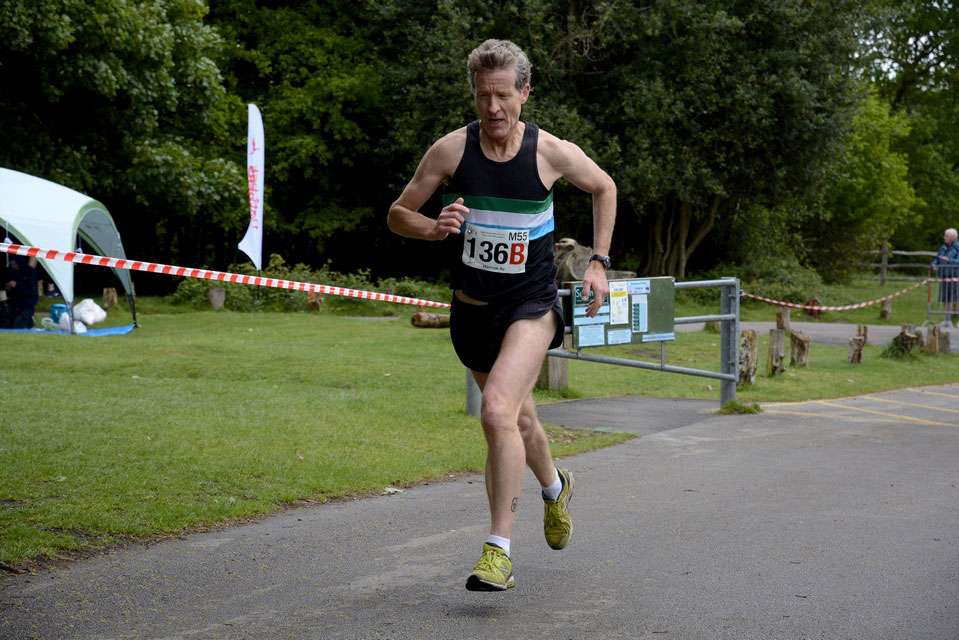
Training
I commend young people to try a full range of sports in order to work out what really appeals. It might be running, football or any other sport. I am biased towards running and I’ve discovered as I’ve got older, that because it’s not a contact sport it’s less physically brutal. It’s a ‘life sport’ like swimming or to some extent cycling. By contrast, Rugby for example, is very different and can have more age-related limitations!
If you’re talking about maturing into an athlete that achieves something and enjoys it, that’s a really long-term thing and like all things that are long – term you mustn’t grab it too enthusiastically. In other words, there are people out there who could have been great runners and maybe were so keen when they were 13 or 14 but have become totally disillusioned later with the sport. They drop out and turn to something else and never became the great 25 – year – old runner that they could have become. So whether it’s running or football or any other sport, I think you need to keep a sense of balance when you are young. That’s why I recommend considering other sports as well and work out at a relatively slow pace, what you really like. With athletics, it’s a very broad – church – 100m is a very different race to 800m and 800m is very different to 5000m and 5000m is nothing like throwing a javelin. So if you go to an athletics track there’s probably something out there that you can really enjoy and be good at. The trick in life is discover what you’re good at. All of us have the potential to discover some particular skill within that we might otherwise never realise and never know about. I was lucky enough to discover that I am a reasonably good runner and I certainly enjoy it, and those two things together have taken me to where I am now.
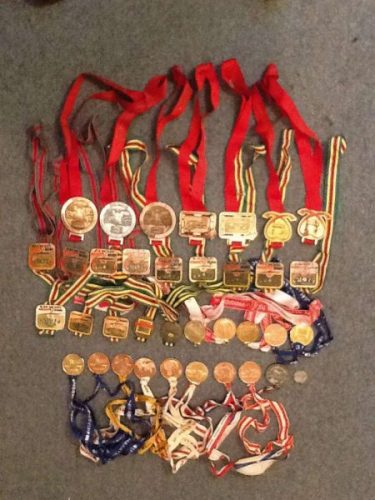
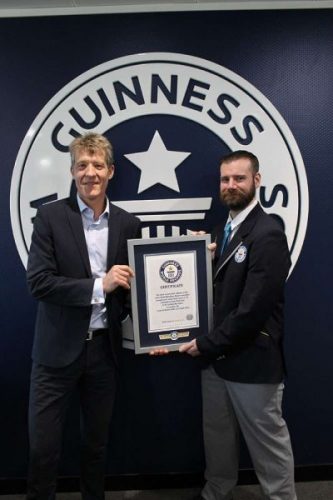
(Left) 36 London medals post the 2016 race
(Right) Receiving my world record award for the most number of consecutively run, sub 3 hour marathons from 1981-2013 – a total of 33
Finally, I am very involved with ‘Parkrun’ in Cranleigh which is a running event that takes place each Saturday at 9.00am in Bruce McKenzie Memorial Field. It draws people from Cranleigh and surrounding areas and is effectively a local running club. It’s for anybody who wants to run or simply wants to keep fit and be out in the open air. Its 5km, and you can run it or walk it. By 10 o’clock people are usually going home or sitting in the Leisure Centre having a cup of coffee, so it’s very friendly. It’s not competitive as such other than with oneself.
If you would like more information on ‘Parkrun’ please visit the web site: www.parkrun.org.uk/cranleigh
For Ben’s documentary on my run across America go to YouTube and search ‘3,000 mile men’











